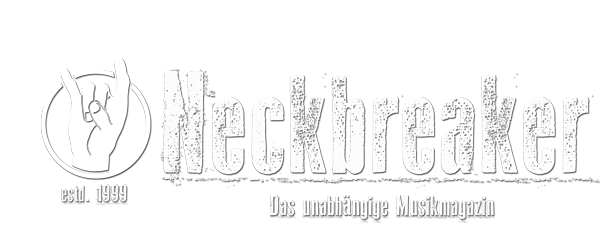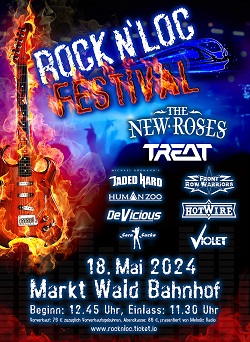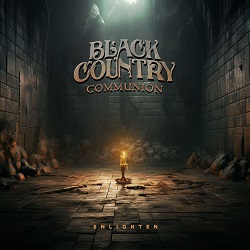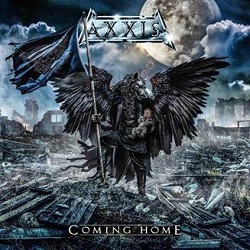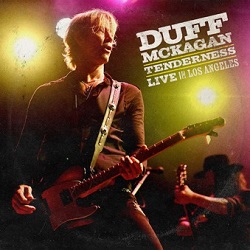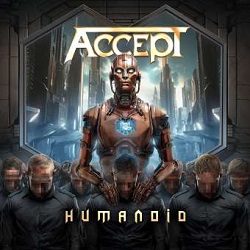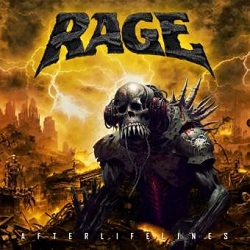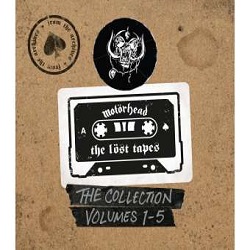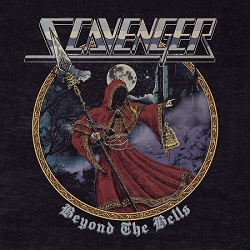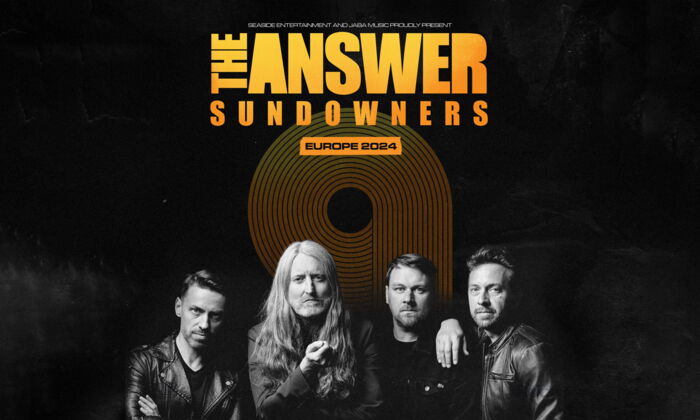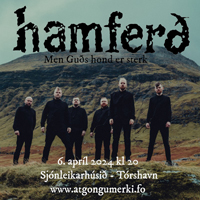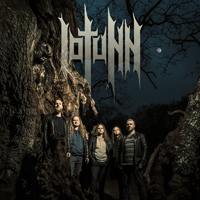 Als ich das Debütalbum von IOTUNN zum ersten Mal hörte, habe ich nur Gutes erwartet, aber es hat mich dann doch umgehauen, wie gut es mir gefallen hat und wie sehr ich es mag. Aber ich bin auch eine vielbeschäftigte Frau und als das Label fragte, ob ich ein Interview mit der Band machen wollte, war meine erste Reaktion: „Nein Mann, ich hab‘ doch keine Zeit für sowas!“, aber geschrieben habe ich: „Lass mich darüber nachdenken, vielleicht bringe ich es noch irgendwo unter.“ Und tja, nachdem ich etwas darüber nachdachte, wurde es mir immer klarer, dass ich eigentlich schon ein Interview machen möchte. Und dass es möglich wäre, das Interview mit Jón Aldará, dem Sänger der Band, zu machen, fühlte sich noch besser an. Wir haben uns seit mehr als einem Jahr nicht gesehen (Danke, Corona), aber dank der schönen neuen Welt der Videoanrufe war es möglich, eine nette Unterhaltung zu führen und sich dabei auch zu sehen. Also haben Jón und ich uns am Samstag nach der Veröffentlichung des Albums zusammengesetzt, um über das IOTUNN-Album „Access All Worlds“ zu reden, darüber, was ihn dazu bewegt hat, noch einer weiteren Band beizutreten, was ihn inspirierte, den perfekten Soundtrack für die derzeitigen Marsmissionen, die Beziehungen zwischen Dänen und Färingern und natürlich über Vögel. Aber lest selbst:
Als ich das Debütalbum von IOTUNN zum ersten Mal hörte, habe ich nur Gutes erwartet, aber es hat mich dann doch umgehauen, wie gut es mir gefallen hat und wie sehr ich es mag. Aber ich bin auch eine vielbeschäftigte Frau und als das Label fragte, ob ich ein Interview mit der Band machen wollte, war meine erste Reaktion: „Nein Mann, ich hab‘ doch keine Zeit für sowas!“, aber geschrieben habe ich: „Lass mich darüber nachdenken, vielleicht bringe ich es noch irgendwo unter.“ Und tja, nachdem ich etwas darüber nachdachte, wurde es mir immer klarer, dass ich eigentlich schon ein Interview machen möchte. Und dass es möglich wäre, das Interview mit Jón Aldará, dem Sänger der Band, zu machen, fühlte sich noch besser an. Wir haben uns seit mehr als einem Jahr nicht gesehen (Danke, Corona), aber dank der schönen neuen Welt der Videoanrufe war es möglich, eine nette Unterhaltung zu führen und sich dabei auch zu sehen. Also haben Jón und ich uns am Samstag nach der Veröffentlichung des Albums zusammengesetzt, um über das IOTUNN-Album „Access All Worlds“ zu reden, darüber, was ihn dazu bewegt hat, noch einer weiteren Band beizutreten, was ihn inspirierte, den perfekten Soundtrack für die derzeitigen Marsmissionen, die Beziehungen zwischen Dänen und Färingern und natürlich über Vögel. Aber lest selbst:
Anne: Herzlichen Glückwunsch zu eurem Album und den vielen positiven Rückmeldungen, die ihr bisher bekommen habt! Ich muss zugeben, dass meine Erwartungen ziemlich hoch waren, da ich wusste, du würdest keiner Band beitreten, die nicht einen gewissen Grad an Qualität erreichen würde und dein und mein Musikgeschmack sind recht ähnlich, von daher ist es nicht sehr wahrscheinlich, dass du bei einer Band mitmachen würdest, die ich nicht mag. Ich hatte also hohe Erwartungen, aber ich wirklich hin und weg davon, wie gut es ist. Und ich nehme an, ihr seid zufrieden, all diese positiven Reviews und Meinungen erhalten zu haben.
Jón: Ja, absolut. Und auch deine.
Anne: Habt ihr überhaupt negative Kritiken bekommen?
Jón: Nicht wirklich. Nicht negativ. Ich habe bisher keine negativen gesehen, es war meistens positiv bis sehr positiv. Natürlich gibt es verschiedenen Grade oder Bewertungen. Viele Bewertungen waren irgendwo bei 8 oder 9 von 10 und dann ein paar 10 von 10. Und dann haben wir noch die etwas seltsameren, wie, ich glaube Deaf Forever verwendet eine Skala bis 15, aber das war auch wirklich gut, es war 12 oder 13 von 15 oder sowas in der Art, und bei Metal Hammer waren es 5 von 7, so um den Dreh. Also alles war über dem Durchschnitt, würde ich sagen. Und die meisten Reviews waren wirklich gut, wir sind alle etwas überwältigt davon, muss ich sagen. Es ist auch etwas komisch, weil das Album schon so lange in unseren Köpfen ist. Es wurde über einen so langen Zeitraum entwickelt und es ist schon ungefähr ein Jahr her, dass wir mit den Aufnahmen fertig wurden. Von daher hat man diese eigenartige Verbindung zu dem Album, wo es nicht mehr wirklich neu ist, aber dann wird es plötzlich wieder neu, wenn wir es durch die Augen von anderen Leuten sehen und die Leute beschreiben, was sie fühlen, wenn sie das Album hören. Und zu sehen, dass die Leute wirklich etwas Positives aus dem Album ziehen – das wiederbelebt es für uns ebenfalls.
Anne: Ich finde, es ist ganz lustig, die Reviews zu lesen, weil nahezu jeder Reviewer ein anderes Genre benutzt, um eure Musik zu beschreiben. Ich habe Black Metal gelesen, Progressive, Melodic Death, Dark Metal, Doom und einige mehr. Ich persönlich würde zu Progressive tendieren, denn das ist eine wirklich große Box, in die man viele Dinge hineinpacken kann. Was würdest du wählen, oder wollt ihr überhaupt einem bestimmten Genre zugeordnet werden oder in eine bestimmte Box gesteckt werden?
Jón: Nun, ich denke, man macht normalerweise Musik, die zu dem passt, was man selbst mag. Von daher denke ich, wir alle mögen bestimmte Dinge, die die Musik, die wir schreiben, inspiriert hat, aber es ist keine bewusste Sache, die wir machen. „Lasst uns etwas machen, das wie dies oder das ist“, und hinterher hören wir dann „Oh ja, ich glaube, da waren wir auf jeden Fall von dieser oder jener Band inspiriert, als wir das geschrieben haben“. Aber ich denke es gibt auf jeden Fall einige Bands, die große Einflüsse sind und vielleicht werde ich sie jetzt absichtlich nicht erwähnen, aber sie wurden in Reviews genannt und es ergibt Sinn. Dass sie ein großer Einfluss sind. Aber sie sind auch verschieden genug und vielseitig genug, dass es schwer ist, unsere Musik direkt mit ihrer zu assoziieren oder zu sagen „das ist eine Kopie von diesem oder jenem.“ Von daher denke ich, es ist vielseitig und komplex genug, was die Einflüsse angeht, dass es schwierig ist, sie genau zu benennen. Ich würde sagen, dass wir irgendwo im Melodic-Death-Metal-Progressive-Bereich angesiedelt sind, aber wenn man nur diese Genre nennt, dann kann man nicht all die verschiedenen Musikstile in seinem Kopf haben, basierend auf diesen Genretags, von daher würde ich lieber kein Genre nennen. Aber ich würde sagen, was die Leute über das Album sagen, ergibt Sinn. Ich meine, selbst die Leute, die sich selbst widersprechen, haben Recht. Oder die anderen widersprechen. Die Leute, die total unterschiedliche Dinge sagen, die haben beide Recht.
Anne: Und was du bezüglich der Bands erwähnt hast, das ist auch ziemlich lustig in den Reviews, denn ihr werdet mit so vielen verschiedenen Bands verglichen. Ich habe glaube ich zehn verschiedene Bands, oder sogar mehr, gelesen. Sie sagen ihr klingt wie INSOMNIUM, wie SCAR SYMMETRY, wie DISSECTION, SANCTUARY, wie THRESHOLD, wie DIMMU BORGIR, und viele mehr…
Jón: Wirklich, diese Bands auch?
Anne: Ja, BATHORY und DISILLUSION, PRIMORDIAL…
Jón: Ja, PRIMORDIAL, BATHORY, ENSLAVED hat glaube ich jemand gesagt. Und vielleicht einige von den Norwegern wie BORKNAGAR und ARCTURUS, habe ich gehört, was definitiv Bands sind, die wir alle, oder die meisten von uns, wirklich lieben, von daher – einiges ergibt Sinn, anderes kann ich nicht wirklich hören, aber ich finde, es ist lustig, denn alle diese Bands, so ziemlich alle Bands, die die Leute erwähnen, sind Bands die ich wirklich mag oder respektiere. Von daher, solange es eine positive Verbindung zu einer wirklich guten Band ist, dann klar, das ist ok.
Anne: Wann und wie bist du ein Mitglied der Band geworden und an welchem Punkt im Songwriting für das Album waren die anderen zu diesem Zeitpunkt?
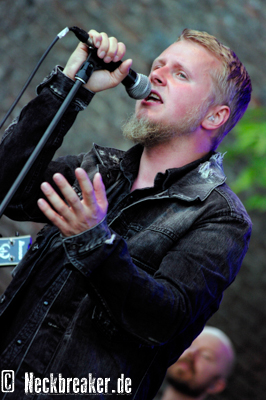 Jón: Ich glaube es war im Winter 2018/19, als ich in den Arbeitsprozess eingestiegen bin, aber da war der größte Teil des Materials schon geschrieben. Die Songstrukturen, die Riffs und die Klanglandschaften waren alle schon arrangiert, aber es fehlte noch der Gesang, der alles verbindet. Aber es waren noch keine Texte geschrieben und auch noch keine Gesangslinien. Mir wurde also einfach freie Hand gewährt, auf meine eigene Art und Weise zu schreiben, und meine eigene Idee, was das Konzept sein sollte, basierend auf der Musik, die ich hörte. Der Grund, weshalb ich eingestiegen bin, war, dass sie mir die Musik zeigten, die sie geschrieben hatten und es war wirklich spektakulär und ich dachte: „Ich will mich daran versuchen und sehen, ob ich irgendwie in diese musikalische Landschaft hineinpasse“. Denn es ist ziemlich verschieden zu dem, was ich bisher gemacht habe. Nicht extrem unterschiedlich, es könnte noch unterschiedlicher sein, es ist immer noch in diesem Bereich stimmungsvoller, atmosphärischer, nordischer halb-progressiver Musik, in dem ich davor gearbeitet habe. Aber es ist dennoch verschieden genug, dass ich es versuchen wollte und so begann ich, Melodien zu schreiben und herauszufinden, wie ich den Gesang innerhalb der Songs arrangieren könnte und es hat wirklich, wirklich Spaß gemacht. Und obwohl Zeit auch ein Faktor war – es war schwierig, die richtige Zeit zu finden zwischen meiner Arbeit, meiner anderen Band und solchen Sachen. Es war eine etwas schwierige Entscheidung, die ich zu treffen hatte. Zu sagen „Ok, ich werde wirklich noch einer weiteren Band beitreten.“ und weißt du, „Das muss wirklich gut sein, wenn ich dem meine nichtexistente Zeit widmen soll“. Aber ich dachte, das ist es und glücklicherweise hat es wirklich Spaß gemacht, daran zu arbeiten. Die Jungs in der Band waren einfach so leidenschaftlich und enthusiastisch und auch talentiert und das ist auch auf eine gewisse Weise inspirierend. Das hat mich die ganze Zeit über in dem Prozess gehalten. Dass sie so involvierend waren. Aber es hat ungefähr ein Jahr gedauert, um wirklich alles zu schreiben und den Gesang aufzunehmen und auch all die kleinen Anpassungen vorzunehmen. Wenn der Gesang kommt, dann beginnt man, den Song auf eine andere Art zu sehen und dann denkt man „Ok, vielleicht können wir das und das ändern, so dass es besser zum Gesang passt und alles.“ Man muss mit den ganzen Instrumenten flexibel sein, so dass sie perfekt zusammenfließen. Von daher gab es viele Anpassungen im Laufe von 2019 und dann Anfang 2020 konnten wir endlich mit dem Mix beginnen.
Jón: Ich glaube es war im Winter 2018/19, als ich in den Arbeitsprozess eingestiegen bin, aber da war der größte Teil des Materials schon geschrieben. Die Songstrukturen, die Riffs und die Klanglandschaften waren alle schon arrangiert, aber es fehlte noch der Gesang, der alles verbindet. Aber es waren noch keine Texte geschrieben und auch noch keine Gesangslinien. Mir wurde also einfach freie Hand gewährt, auf meine eigene Art und Weise zu schreiben, und meine eigene Idee, was das Konzept sein sollte, basierend auf der Musik, die ich hörte. Der Grund, weshalb ich eingestiegen bin, war, dass sie mir die Musik zeigten, die sie geschrieben hatten und es war wirklich spektakulär und ich dachte: „Ich will mich daran versuchen und sehen, ob ich irgendwie in diese musikalische Landschaft hineinpasse“. Denn es ist ziemlich verschieden zu dem, was ich bisher gemacht habe. Nicht extrem unterschiedlich, es könnte noch unterschiedlicher sein, es ist immer noch in diesem Bereich stimmungsvoller, atmosphärischer, nordischer halb-progressiver Musik, in dem ich davor gearbeitet habe. Aber es ist dennoch verschieden genug, dass ich es versuchen wollte und so begann ich, Melodien zu schreiben und herauszufinden, wie ich den Gesang innerhalb der Songs arrangieren könnte und es hat wirklich, wirklich Spaß gemacht. Und obwohl Zeit auch ein Faktor war – es war schwierig, die richtige Zeit zu finden zwischen meiner Arbeit, meiner anderen Band und solchen Sachen. Es war eine etwas schwierige Entscheidung, die ich zu treffen hatte. Zu sagen „Ok, ich werde wirklich noch einer weiteren Band beitreten.“ und weißt du, „Das muss wirklich gut sein, wenn ich dem meine nichtexistente Zeit widmen soll“. Aber ich dachte, das ist es und glücklicherweise hat es wirklich Spaß gemacht, daran zu arbeiten. Die Jungs in der Band waren einfach so leidenschaftlich und enthusiastisch und auch talentiert und das ist auch auf eine gewisse Weise inspirierend. Das hat mich die ganze Zeit über in dem Prozess gehalten. Dass sie so involvierend waren. Aber es hat ungefähr ein Jahr gedauert, um wirklich alles zu schreiben und den Gesang aufzunehmen und auch all die kleinen Anpassungen vorzunehmen. Wenn der Gesang kommt, dann beginnt man, den Song auf eine andere Art zu sehen und dann denkt man „Ok, vielleicht können wir das und das ändern, so dass es besser zum Gesang passt und alles.“ Man muss mit den ganzen Instrumenten flexibel sein, so dass sie perfekt zusammenfließen. Von daher gab es viele Anpassungen im Laufe von 2019 und dann Anfang 2020 konnten wir endlich mit dem Mix beginnen.
Anne: Denkst du, dass sich der Songwritingprozess für das nächste Album etwas ändern wird, nun da ihr eine komplette Band seid?
Jón: Ja. Ja, ich denke schon. Natürlich, unser Bassist, Eskil, er kam sogar noch später in die Band als ich, es waren also so ziemlich der ganze Gesang und die ganzen Songs schon geschrieben, als er gefragt wurde, ob er ein paar Bassparts einspielen kann. Ansonsten war es Jens Nicolai Gräs, der Gitarrist, der den Bass aufgenommen hat, aber wir dachten alle „Weißt du was? Es würde das Ganze auf einen ganz neuen Level heben, mit einem richtigen, anständigen Bassisten, der anständige Bassarrangements macht, die nicht nach Gitarre klingen.“ Und Eskil ist wahnsinnig talentiert, sowohl technisch als auch kreativ, bezüglich Groove und allem, also es hat wirklich, wirklich das gesamte Album verbessert, dass er einsteigen konnte und seine eigenen Bassarrangements in den Songs kreieren konnte. Ich war wirklich überrascht zu sehen, dass man das auf diese Weise machen konnte. Normalerweise ist die Position des Basses im Metal ja darauf beschränkt, das Oomph und die Power bereitzustellen und einfach nur irgendwie den Gitarren so viel wie möglich zu folgen, aber Eskil ging in eine ganz andere Richtung, was fantastisch ist. So… ja, was war deine ursprüngliche Frage?
Anne: Ich hatte gefragt, ob sich der Songwritingprozess in Zukunft ändern wird, jetzt, da ihr eine komplette Band seid.
Jón: Ja, genau. Also weißt du, das ist eine etwas seltsame Sache. Der Bassist steigt so spät ein. Ich steige so spät ein. Von daher denke ich, dass es da auf jeden Fall einige Änderungen geben wird, wir werden dem Prozess von einem viel früheren Punkt an folgen können. Es werden immer noch Jesper und Jens Nicolai, die Gitarrenbrüder sein, sie schreiben eine Menge Zeug, sie sind sehr, sehr produktiv, was das Schreiben von Material angeht und vieles davon ist wirklich, wirklich wahnsinnig gut. Da können wir nicht so viel mitgehen. Also kreieren sie die Songs, so dass wir danach die Arrangements fortsetzen können. Ich denke, so wird der Prozess ablaufen. Aber jetzt können wir natürlich zu einem viel früheren Zeitpunkt einsteigen und sagen „Weißt du, ich habe eine Gesangsmelodie, die besser passen würde, wenn wir das so machen.“ Was den Bass angeht, denke ich, dass wir den Bass und die Gitarren etwas näher beieinander und umeinander arrangieren können, von daher wird es auf jeden Fall vielleicht ein etwas ganzheitlicher und kompletterer Weg des Schreibens und Arrangierens sein. Es wird interessant sein zu sehen, wie das das nächste Album beeinflusst. Aber andererseits ist das nächste Album schon fast komplett geschrieben. Und das dritte ist schon fast unterwegs. Ich meine, sie schreiben so viel. Von daher gibt es da keinen Mangel an Material, aber das bedeutet natürlich nicht, dass wir es nehmen, zusammenwürfeln und raushauen können. Es ist eine Menge Arbeit, das Album sinnvoll zusammenzusetzen aber wir sind auf jeden Fall mit dem zweiten Album gut unterwegs.
Anne: Corona war und ist immer noch eine Herausforderung für die gesamte Musikszene, aber hat es auch eure Zusammenarbeit verkompliziert oder hat es sie vielleicht auch einfacher gemacht, weil es ja kaum Dinge gibt, die einen beim Arbeiten stören oder ablenken könnten, da ja niemand Konzerte spielen muss, es gibt keine Touren und privaten Urlaube?
Jón: Hm. Ich denke, dadurch, dass es uns möglich war, das Album aufzunehmen und zu mischen kurz bevor Corona eingeschlagen ist, gab es keine wirklichen Beschränkungen. Ich meine, wenn wir ein Jahr später mit den Arbeiten am Album angefangen hätten, dann wäre es uns nicht möglich gewesen, den Prozess so durchzuführen, wie wir es gemacht haben. Denn was wir gemacht haben war das: Ich bin jeden Monat von den Färöern nach Dänemark geflogen, um in Kopenhagen am Gesang zu arbeiten und ihn aufzunehmen, das waren eine Menge Trips. Eine Menge Reisen. Das ganze Jahr 2019 hindurch. Praktisch von Januar bis Dezember oder sogar Januar oder Februar 2020. Und dann schlug Corona zu, wann war das noch? Ich glaube Ende Februar, als es begann, ernst zu werden? Hier in der Gegend zumindest, und wir wurden gerade zu dem Zeitpunkt mit dem Mix fertig. Von daher ist das - ok. Das Album ist fertig, jetzt können wir uns nach Labels und solchen Sachen umsehen. Diesbezüglich hat uns Corona nicht wirklich auf irgendeine Weise beeinflusst. Das einzige, wo es uns beeinflusst, ist jetzt. Rund um die Arrangements zum Albumrelease. Denn wir hatten eigentlich ein Releasekonzert geplant mit ein paar nachfolgenden Konzerten und etwas touren. Aber jetzt hat es endlich angefangen, den Fluss der Albumveröffentlichung und dieses Zeug zu stören. Wir hatten ein paar Konzerte für letztes Jahr vorgesehen, die natürlich abgesagt wurden, beinahe direkt, aber das waren nicht viele. Das ist jetzt… das ist etwas ernster. Aber weißt du, alle anderen Bands müssen auch damit zurechtkommen, von daher können wir nicht sagen, dass wir in der Beziehung irgendwie besonders betroffen sind. Aber ich denke auch nicht, dass es irgendeinen positiven Effekt für uns hatte, wirklich nicht. Es war nur so, wir hatten das Album und das ganze Paket fertig und haben uns auf die Suche nach einem Label gemacht und von daher waren wir darauf vorbereitet, dass es eine gewisse Zeitspanne geben würde, einfach um die richtige Aufstellung zu finden, um das Album zu veröffentlichen und so ist alles mehr oder weniger nach Plan gelaufen. Bis jetzt.
“Ich denke, das Album wird ein ziemlich guter Soundtrack sein für Leute, die diese Marsmissionen verfolgen.”
Anne: Aber ich meine, du hast gesagt, ihr habt schon angefangen, Songs für das zweite und das dritte Album zu schreiben, hat es einen Einfluss auf diese Arbeiten?
Jón: Hm, ja, das ist gut möglich. Wir haben gerade dieses hier veröffentlicht, von daher denke ich, die Arbeiten am zweiten Album laufen kontinuierlich – wir sind noch nicht ganz sicher, wie viel Zeit wir benötigen werden, um zu einem Ergebnis zu kommen. Ich denke, es gibt den Plan, dieses Jahr schon einige Aufnahmen zu machen, aber ich habe das HAMFERÐ-Album, auf das ich mich jetzt konzentrieren muss. Von daher werde ich in die Arbeiten für das zweite IOTUNN-Album nicht sofort einsteigen. Für mich wird es zunächst etwas langsamer sein, da es zwei Alben gleichzeitig sind. Von daher werden wir sehen und wir hoffen, erwarten vielleicht auch, dass es nach dem Sommer weniger Beeinträchtigungen durch Corona geben wird, wenn alle Impfungen, zumindest in der Westlichen Welt, durchgeführt wurden. Also vielleicht wird sich der Griff von Corona gegen Ende des Jahres etwas lösen und vielleicht werden wir dann frei sein, die Dinge so wie üblich zu tun. Aber, weiß du, wir können nur hoffen.
Anne: Ja. Bist du der einzige, der für die Texte verantwortlich ist oder steuern die anderen auch Ideen bei?
Jón: Zum größten Teil. Ich würde sagen 99%. Und dann diskutiere ich sie mit den anderen und wenn die anderen interessante Ideen haben bin ich immer offen und manchmal verwende ich sie und manchmal bin ich einfach ein Diktator und sage “Nein, weißt du was, ich bin derjenige, der entscheidet!” [lacht]. Nein, ich mache nur Spaß. Es ist ziemlich entspannt und ich habe ziemlich freie Hand bei diesem Aspekt, aber ich bin immer offen für Ideen. Also ja, es gibt einen kleinen Einfluss sowohl auf die Texte als auch was das Arrangement angeht, aber musikalisch kam jede Menge Input von den anderen, bezüglich der Gesangsarrangements, dem Kreieren von Melodien und solche Dinge. Das war mehr ein Prozess der Zusammenarbeit. Aber die Texte stammen hauptsächlich von mir, ja.
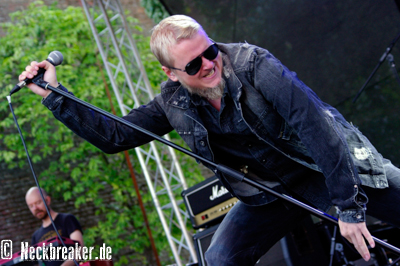 Anne: Und kannst du ein wenig über die Geschichte des Album und um was es darin geht erzählen?
Anne: Und kannst du ein wenig über die Geschichte des Album und um was es darin geht erzählen?
Jón: Ja. Sehr einfach gesprochen geht es um eine Crew von Raumfahrern an Bord eines Forschungsschiffes namens Garganey I. Sie verlassen die Erde, die eine Art zerfallene, dystopische Zukunftswelt ist, wo die Menschheit durchhält, um zu überleben und sie ist nicht mehr wirklich bewohnbar. Also machen sie sich auf die Suche nach anderen Planeten, wo die Menschheit weiterhin existieren kann. Das ist der generelle Hintergrund der Geschichte. Und dann – ist sie auf eine Art sehr thematisch. Sie philosophiert etwas über den Platz der Menschheit im Universum und was wir zu unserer Existenz hinzufügen, sind wir das Zentrum der Existenz? Müssen wir als Rasse fortbestehen? Können wir als Rasse fortbestehen in anderen Teilen des Universums? Können wir weiterhin existieren ohne einige der Dinge von der Erde, die wir als notwendig erachten? Und solche Dinge. Also sie besuchen verschiedene Planeten und testen sie, finden außerirdische Lebensformen, die auf eine völlig andere Art leben als Menschen und versuchen herauszufinden „Können wir auf diese Weise leben? Ist das ein Leben für uns?“ Davon gibt es eine ganze Menge, die Seele der Menschheit, was brauchen wir? Nicht nur, um zu überleben, sondern um sinnstiftend zu existieren. Also sie besuchen diese verschiedenen Arten von Planeten, die nicht wirklich bewohnbar sind und dann, am Ende, finden sie diese Art von paradiesischem Planetensystem, wo alles wie Utopia erscheint, wie ein perfektes Paradies, wo die Menschen vielleicht existieren können, aber sie haben ein Problem: Sie können wählen, ob sie entweder selbst dort bleiben und die Menschheit dort fortführen, oder sie können die Technologie des Raumschiffs verwenden, um zur Erde zurückzukehren und die Menschen von diesem Ort wissen zu lassen. Und versuchen, den Rest der Menschheit zu retten. Aber diese Technologie wurde noch nie zuvor getestet. Sie wissen also nicht wirklich, ob es sie verdammen wird oder ob es ihnen helfen wird, den Rest der Menschheit zu retten. Es gibt also eine Art Dilemma dort am Ende. So endet es.
Anne: Woher hast du die Idee für die Texte oder das gesamte Thema genommen und was war deine Inspiration?
Jón: Das ist eine gute Frage. Es kam einfach so zustande. Ich hörte die Musik und ich wollte etwas spaciges machen und die Musik gab mir das Gefühl, in einer fast mythischen Weise durch den Raum zu fliegen. Eine seltsame Art von Gefühl. Etwas von der Musik ist ein kleines bisschen psychedelisch auf eine gewisse Art und Weise und auch atmosphärisch, so dass wir alle übereinstimmten, dass es cool wäre, diese Art von seltsamer, philosophischer Reise durch den Raum zu haben. Also habe ich begonnen, von dort an zu arbeiten. Wirklich fast ausschließlich von einem visuellen Aspekt aus und dann dachte ich, „Ok, das wäre ein ziemlich cooler Rahmen für die Texte“, die sowohl das große Thema unseres Platzes im Universum zu behandeln, aber auch die Leute an Bord, die unsicher sind und ängstlich und aufgeregt, alles gleichzeitig. Die verschiedene Gefühlsregungen erfahren, während sie unterschiedlichen Planeten begegnen und neuen Dingen, aber auch Hoffnungslosigkeit und Zweifel. Hat das alles einen Sinn? Diese Art Dinge. Sie machen also viele große Emotionen durch und ich mag das sehr, weißt du? Und ich denke, es passt wirklich gut zur Musik. Ich denke, es kam einfach vom Hören der Musik, die die Gräs-Brüder vorher geschrieben hatten.
Anne: Wie viel Jón, der Naturwissenschaftler, und wie viel Jón, der Dichter, steckt in den Texten?
Jón [lacht]: Das ist eine gute Frage. Ich denke, hauptsächlich der Dichter, was oft der Aspekt ist, den ich zum Leben erwecke, wenn es um Musik geht, aber, weißt du, in gewisser Weise informiert durch den Naturwissenschaftler. Natürlich, ich bin Biologe, und so habe ich mir diese verschiedenen Arten, außerhalb der Erde zu existieren, wo Lebewesen existieren könnten, ausgedacht. Manchmal in totalem Chaos, immerwährendem Chaos, manchmal mit einer geeigneten Biosphäre, vielleicht nur in Dreck mit sehr, sehr, sehr beschränkten Ressourcen, wo Maschinen die meiste Arbeit erledigen. Also dieser Teil meines Lebens hat definitiv einige dieser Aspekte inspiriert. Und natürlich die generelle Idee von der Bedeutung des Lebens im Universum, die – ich denke, Wissenschaft informiert auf viele Arten. Also, dieser Teil von mir ist nicht komplett außen vor, nein.
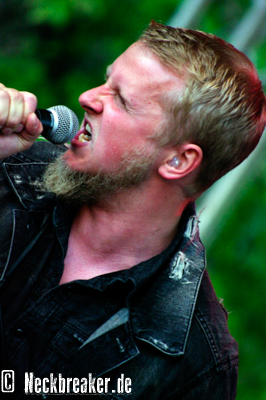 Anne: Der Opener heißt “The Voyage Of The Garganey I”. Werden wir in der Zukunft etwas von der Garganey II hören?
Anne: Der Opener heißt “The Voyage Of The Garganey I”. Werden wir in der Zukunft etwas von der Garganey II hören?
Jón: [lacht]: Die Garganey II! Nun, das ist eigentlich eine gute Frage. Denn… wird es eine Garganey II geben? Die Garganey I ist das Raumschiff und an diesem Punkt wurde nur eine jemals gebaut und ich denke, wir werden beim nächsten Mal einen etwas anderen Weg gehen. Wir gehen einen Weg, auf dem wir kein Raumschiff brauchen, denke ich. Wahrscheinlich. Aber man weiß ja nie. Man weiß nie. Es ist nicht in Stein gemeißelt. Aber wir denken darüber nach, beim nächsten Mal etwas Irdischeres zu machen, etwas älteres, das irgendwie aus dem Inneren der Erde kommt. Aber ich bin auf jeden Fall daran interessiert, es mit diesem ersten Album zu verknüpfen, also lass uns sehen, ob es irgendwelche Hinweise auf die Garganey II gibt. Wir werden sehen.
Anne: Mit der offiziellen Veröffentlichung gestern habt ihr die Marslandung um rund eine Woche verpasst. Und es gibt diesen Monat ja drei Marsmissionen. War das also ein netter Zufall oder war es geplant, das Album in diesem Monat zu veröffentlichen?
Jón [lacht]: Ja, es war geplant, es diesen Monat zu veröffentlichen, aber es ist eine Art lustiger Zufall würde ich sagen. Ich denke, wir hätten vielleicht ein größeres Spektakel daraus machen sollen, es etwas besser miteinander verbinden sollen, aber weißt du was? Ich denke, das Album wird ein ziemlich guter Soundtrack sein für Leute, die diese Marsmissionen verfolgen. Die Artikel darüber lesen, sich Fotos vom Mars ansehen und dann die Musik hören – ich denke, das würde perfekt passen, um ehrlich zu sein.
Anne: Wenn man das Wort “Garganey” liest oder hört, dann klingt es zunächst einmal eher wie etwas aus einem russischen Raumfahrtprogramm, aber in Wirklichkeit ist es der Name einer Ente [Knäkente, Anm. D. Verf.], die beim Vogelzug sehr große Distanzen zurück legt. Ist das eine Art irdischer Aspekt in dem Thema?
Jón: Ja. Ja, ist es. Es ist diese interessante Entenart, denn sie ist sowohl wirklich schön, als auch gleichzeitig unspektakulär. Es ist eine Art übersehene Spezies. Sie wird leicht übersehen, weil es oberflächlich betrachtet eine kleine, braune Ente ist und ich dachte, das ist irgendwie cool, denn es ist auf jeden Fall ein eigenständiges Ding, eine ganz eigene Spezies, die ihre eigene Lebensgeschichte hat und alles und von daher repräsentiert es eine einzigartige Sache, die irgendwie unter dem Radar fliegt. Irgendwie dachte ich, dass das sehr gut als Name für das Raumschiff passen würde, das Raumschiff inspirieren würde. Nichts wirklich spektakuläres, aber dennoch wirklich einzigartig. Und natürlich passt der Vogelzugpart gut zum Thema der weiten Reise durch das Universum. Und es ist natürlich eine Referenz zu Natur und Biologie und dieser Art von Dingen und das macht das Raumschiff zu etwas irdischem und echtem.
Anne: Ich denke, da ist auch ein Vogel auf dem Cover und auch im Video zu “Weaver Systems” kann man Vögel sehen. Also welche Rolle spielen Vögel in dieser Weltraumreise?
Jón [lacht]: Nun, ich denke sie sind schon immer ein Symbol der Freiheit für die Menschen gewesen. Diese Art von Freiheit, sich durch den dreidimensionalen Raum zu bewegen während wir erdgebundene Kreaturen dazu verdammt sind, meist zweidimensional zu wandern [lacht]. Also, da ist generell etwas wirklich Inspirierendes an Vögeln und wie sie fähig sind, so komplett anders als wir zu existieren. Sowohl Luft als auch Land und oft auch die See und Wasser zu ihrem Vorteil zu nutzen und ja, sie sind ein Symbol der Freiheit und ich denke, das ist auch in gewisser Art die Idee des Albums. In gewisser Weise einen sicheren Raum zu finden, wo die Menschheit frei sein kann fortzubestehen und solche Dinge. Es sind diese generellen Ideen von Freiheit, denke ich.
Anne: Ich finde generell, dass man das lyrische Konzept sowohl als Reisen durch den Raum, als auch als Reise durch das menschliche Leben betrachten kann. Was denkst du darüber?
Jón: Oh ja. Auf jeden Fall, ja. Da bin ich bei dir, dass es grundsätzlich die innere Welt mit der äußeren Welt verknüpft auf eine Weise, die wir sehr interessant finden. Dass wir sowohl in uns selbst als auch außerhalb von uns selbst leben und wir sehen die große Perspektive, aber wir sind gleichzeitig auch in unserer eigenen speziellen Perspektive verloren. Das ist – ich würde sagen Dualität – aber es ist auch ein bisschen paradox, dass wir versuchen, die großen Lösungen zu finden, die gewaltigen Verbindungen zwischen Gruppen von Menschen und dann haben wir immer gleichzeitig unsere eigenen, persönlichenZiele. Und das ist eine Art Kampf zwischen diesen Aspekten, finde ich. Und das ist sehr interessant.
“Du willst die Leute ja nicht frustrieren oder unnötig langweilen.”
Anne: In dem Diskussionsvideo zu “The Tower Of Cosmic Nihility” sagen Jens and Jesper, dass der Song ursprünglich 18 bis 20 Minuten lang war und dann habt ihr ihn auf 7:30 min gekürzt. Wie geht ihr in einem solchen Fall vor?
Jón: Oh, das weiß ich gar nicht. Die Version die ich gehört habe war schon so ziemlich diese, fertige. Aber wir haben auf jeden Fall einige Songs gekürzt in der Zeit in der ich auch an dem Album mitgearbeitet habe. Es ist wirklich wichtig, dass man eine genaue Vorstellung davon hat, was man mit dem Song macht. Und manchmal kann man davongetragen werden, wenn man den Ideen folgt und wenn einen der Song fast hin zur Absurdität führt. Und dann hat man auf einmal einen 20-Minuten-Song in den Händen. Vielleicht findet man die einzelnen Ideen wirklich gut, aber wenn man den ganzen Song hört und ihn sich ansieht, dann denkt man „Weißt du was? Ich denke, der Song wäre stärker, wenn wir ihn hier und da und dort etwas beschneiden.“ Und dann versucht man den Kern des Songs zu finden. Und wenn wir dann noch etwas zusätzlich dazu bauen müssen, dann können wir das hinterher noch machen. Aber dann muss man sehen, worauf der Song zielt und was er sagt und warum… Wie lang muss er sein? Muss er 20 Minuten lang sein? Oder stecken zwei oder drei verschiedene Songs darin? Dann könnte es separat sein. Es ist also ziemlich wichtig, vor allem für den Hörer, denke ich. Andere Leute, die etwas aus deiner Musik herausziehen sollen. Du willst die Leute ja nicht frustrieren oder unnötig langweilen. Also das ist eine wichtige Arbeit.
Anne: Ich habe dich oft und auf vielen Veröffentlichungen singen gehört, aber ich muss zugeben, ich war überrascht zu hören, dass du sogar noch besser geworden bist – meiner Meinung nach. Ich würde sogar sagen, dass es deine beste Gesangsleistung ist, die ich bisher gehört habe und du verwendest auch einige Gesangsstile, von denen ich denke, dass ich sie von dir noch nicht gehört habe, zumindest nicht in diesem Umfang, wie in “Laihem’s Golden Pits” oder in “Waves Below”. Ich glaube, ich habe dich nie so brutal singen gehört.
Jón: Oh, danke! Vielen Dank! Ich freue mich, dich das sagen zu hören. Und gut, ich habe diesen Stil hier und da schon etwas verwendet. An einigen Stellen in manchen HAMFERÐ-Songs benutze ich das. Wenn du zurück gehst zur ersten EP von HAMFERÐ, im Song “Vráin” ist ein kleines bisschen davon und auch der Song “Sinnisloysi” vom Album “Evst” hat ein bisschen was davon. Ich hatte also schon immer das Bedürfnis, ein bisschen von dieser Art Semi-Shouting einzufügen, das dem Song einen ganz anderen Vibe gibt als Growling oder Klargesang. Ich habe von Natur aus eine weiche, klare Stimme, wenn ich singe. Es ist nicht sehr natürlich für mich, diese Art von Aggression hineinzulegen, aber dann habe ich diese andere Art zu singen gefunden und es scheint zu funktionieren, speziell bei diesen beiden Songs, “Laihem’s Golden Pits” und “Waves Below”. Also dachte ich “Ok, lass uns das hier versuchen.”, denn das ist es, was ich höre, diese Art wahnsinniger-Mann-auf-dem-Gipfel-eines-Berges-stehend-und-schreiend. Aber... ja, es freut mich, dass du das bemerkt hast [lacht].
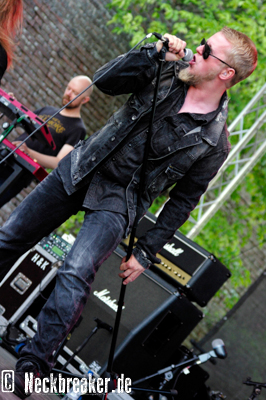 Anne: Und jetzt eine technische Frage: Was für ein Mikrofon verwendest du?
Anne: Und jetzt eine technische Frage: Was für ein Mikrofon verwendest du?
Jón [leise]: Oh scheiße [Ich hab’ das gehört! - Anne]. Wir haben ein Shure SM7 verwendet, glaube ich... ja, es war ein Shure SM7.
Anne: Also du hast das für die Aufnahmen benutzt?
Jón: Ja. Es ist das Mikrofon von Bjørn, dem Drummer. Er ist derjenige, der das Album aufgenommen hat und ja, es ist sein Mikrofon, ein Shure SM7. Das wirklich richtig gut. Ich hatte damit zuvor noch keine Aufnahmen gemacht. Ich hatte immer verschiedene Mikros, habe mich nie auf ein spezielles festgelegt, sondern einfach genommen, was sich im Studio richtig angefühlt hat und was zur Verfügung stand. Aber ich denke, es war ziemlich gut.
Anne: Bevorzugst du ein bestimmtes, wenn du live auftrittst?
Jón: Ich habe mein eigenen Livemikro, ein KSM9, welches ein Kondensatormikro ist, von daher hat es einige wirklich, wirklich coole Qualitäten, die es mir auch erlauben, physisch etwas mehr damit zu arbeiten und es klingt wirklich großartig. Es hat einen super klaren und tollen Klang. Ich bin wirklich glücklich damit, ich benutze es immer, wenn ich auftrete.
Anne: Mir gefällt es sehr, wie ihr die Songs arrangiert habt, zum Beispiel in “The Tower Of Cosmic Nihility”. Es gefällt mir wirklich, wie das Schlagzeug langsam in den Vordergrund kommt, und kurz bevor es zu viel wird, kehrt es in den Hintergrund zurück und lässt den anderen Instrumenten mehr Raum.
Jón: Ja, das ist Bjørns Vorstellung von den Songs, denn er arbeitet sein Drumming in die Songs, erschafft seine eigene Schlagzeugwelt, seine eigene rhythmische Welt innerhalb der Songs. Also das kommt alles von ihm. Und es ist wirklich faszinierend, was er kann, wie gut er darin ist, diese Dynamik innerhalb eines Songs zu kreieren. Er hat einen sehr einzigartigen Schlagzeugstil, finde ich, der an sich nicht besonders auffällig ist, aber immer noch sehr stark bei den Fills und sehr Doublebass-lastig und so. Er ist auch seltsam subtil. In diesem Sinne, denke ich. Ich habe noch gar nicht bewusst darüber nachgedacht, aber jetzt, wo du es erwähnst, ja, es ist eine wirklich coole Sache.
Anne: Mir gefällt es auch, wie ihr die perfekte Balance zwischen atmosphärischen Sounds und den wirklich harten Parts hinbekommen habt.
Jón: Ja. Das sind üblicherweise die Gitarren. Die Gräs-Brüder lieben es, wirklich laut zu spielen. Laut und rau. Roh. Von daher ist es hauptsächlich ihr Gitarrensound, der das Album wirklich sehr dominiert. Und dann, wie du sagst, gibt es diese verschiedenen Effekte und Synths und Gitarreneffekte und Zeug, das allem etwas Würze verleiht. Es ist sehr subtil, aber ja, ich bin sehr glücklich mit dem Gleichgewicht zwischen diesen Dingen.
Anne: “Save Across The Endless Night” klingt wirklich wie die Essenz des Album und beinhaltet mehr oder weniger alles und selbst wenn man das nicht vom Text her mitbekommen, dann versteht man es über die Musik, was ich sehr beeindruckend finde.
Jón: Ja, das ist nicht das erste Mal, dass ich das höre und ich finde, es ergibt eine Menge Sinn. Ich finde, “Save Across The Endless Night” ist wahrscheinlich der vielseitigste Song. Es klingt also etwas wie eine Zusammenfassung, denke ich.
Anne: Mir gefallen auch der Sound und die Produktion, sie sind sehr detailliert und differenziert, man kann jedes einzelne Instrument heraushören und der Sound ist wirklich gut, ziemlich schlagkräftig. Und so passiert es mir, dass viele andere Alben, wenn ich sie nach eurem höre – ja, leer klingen. Und ich finde auch, es hat einen ganz leichten frühe-2000er-IN-FLAMES-Touch, der, denke ich, von Fredrik Nordström kommt.
Jón: Ja, ich liebe das total. Weiß du, viele der besten Produktionen – meiner Meinung nach, sie sind das, was ich mit dem besten im Metal verbinde – sind die späten 90er-Produktionen, in der Regel Schwedisch. Weißt du, es gab da diesen Sound, der so schwer zu imitieren ist. Und dann hat man all diese wirklich, wirklich großartigen Produzenten, Daniel Bergstrand und Fredrik Nordström und Peter Tägtgren, all die schwedischen Großen und natürlich auch die Älteren, Tomas Skogsberg, die Typen, die den früheren Death Metal gemacht haben. Irgendwie gibt es diese wirklich coole Geschichte in Schweden, dass sie einfach wissen, was man soundmäßig mit Metal anstellen muss. Von daher bin ich wirklich glücklich mit der Entscheidung, zu Fredrik Nordström zu gehen, um das Album zu machen, denn er hat wirklich diesen tiefen und legendären, kraftvollen Sound. Fast schon zu viel an manchen Stellen, aber das ist... ich finde, es passt zum Album.
Anne: Ich denke, du hast meine nächste Frage bereits beantwortet, denn die wäre gewesen “Habt ihr schon Ideen für das nächste Album?” Ich denke, die habt ihr.
Jón: Ja, wir haben so ziemlich alle Ideen für das nächste Album.
Anne: Und du bist jetzt offiziell Sänger in drei Bands, in wie viele willst du noch einsteigen...
Jón: In keine mehr! In keine mehr! [lacht]
Anne: … und hast du keine Angst, dass du in zeitliche Konflikte geraten könntest oder keine Zeit zum touren mehr hast?
 Jón: Nein, nein, das ist unmöglich. Aber andererseits würde ich sagen, dass ich im Moment in zwei aktiven Bands bin und BARREN EARTH schläft gerade, würde ich sagen. Wir sind alle ziemlich beschäftigt mit unseren anderen Sachen, von daher haben wir alle kein Problem damit, dass BARREN EARTH gerade schläft und wer weiß, ob sie wieder aufwachen wird, aber ja, es sind hauptsächlich IOTUNN und HAMFERÐ, die im Moment meine Zeit in Anspruch nehmen. Und bisher hat Corona uns gut dabei geholfen, jegliche Konflikte zu vermeiden [lacht], aber wir werden sehen, was die Zukunft bringt. Ich bin kein Profimusiker, ich bin ein Vollzeitbiologe und von daher... widme ich mich diesen Problemen, wenn sie tatsächlich entstehen, denke ich.
Jón: Nein, nein, das ist unmöglich. Aber andererseits würde ich sagen, dass ich im Moment in zwei aktiven Bands bin und BARREN EARTH schläft gerade, würde ich sagen. Wir sind alle ziemlich beschäftigt mit unseren anderen Sachen, von daher haben wir alle kein Problem damit, dass BARREN EARTH gerade schläft und wer weiß, ob sie wieder aufwachen wird, aber ja, es sind hauptsächlich IOTUNN und HAMFERÐ, die im Moment meine Zeit in Anspruch nehmen. Und bisher hat Corona uns gut dabei geholfen, jegliche Konflikte zu vermeiden [lacht], aber wir werden sehen, was die Zukunft bringt. Ich bin kein Profimusiker, ich bin ein Vollzeitbiologe und von daher... widme ich mich diesen Problemen, wenn sie tatsächlich entstehen, denke ich.
Anne: Du bist jetzt mit beiden Bands, HAMFERÐ und IOTUNN, beim gleichen Label. Wäre es möglich, dass ihr zusammen auf Tour geht oder wären zwei Auftritte pro Abend einfach zu viel für dich als Sänger?
Jón: Ja! Ja, ich denke das wäre zu viel. Ich habe es, glaube ich, einmal versucht, auf einem Festival am gleichen Tag mit BARREN EARTH und HAMFERÐ aufzutreten und es war machbar, aber es war nicht sehr leicht. Und ich bin ein wenig ängstlich, was eine Tour mit mir machen würde, wenn ich zwei verschiedene Auftritte absolvieren müsste. Und beide Bands sind physisch sehr fordernd. Oder zumindest ist meine Art zu performen physisch sehr fordernd, von daher denke ich, es wäre zu viel. Das ist etwas, was ich möglichst vermeiden möchte. Auf unbestimmte Zeit.
Anne: Ja, das ist verständlich. Gibt es überhaupt schon irgendwelche Pläne für Touren, da man im Moment ja sowieso nichts wirklich planen kann?
Jón: Ja, wir arbeiten an Plänen. Da ist etwas in Arbeit für nächstes Jahr, 2022. Aber es wurde noch nichts öffentlich bekannt gegeben, von daher werde ich nicht zu viel verraten – man weiß ja nie heutzutage. Aber es ist auf jeden Fall etwas, das schon weit entwickelt ist. Also alles, was es wirklich braucht, ist die Sicherheit vom Lockdown und solches Zeug. Ich denke dieses Jahr wird es vielleicht ein paar lokale Auftritte, kleine Touren, sowas wie Wochenendtouren geben, falls wir das hinbekommen. Also das haben wir im Moment in Vorbereitung. Aber ansonsten ist es sehr unsicher, mehr zu sagen.
Anne: Wir haben schon meine letzte Frage erreicht, sie ist nicht ganz ernst gemeint, aber wie schwer ist es, als einziger Färinger in einer dänischen Band zu spielen und behandeln sie dich gut?
Jón [lacht]: Seltsamerweise ist es wirklich nett. Aber ja, es ist ja nicht unbekannt, dass die Färinger und die Dänen ihre Art freundschaftlichen Streit haben, wenn man es so nennen will. So ein bisschen Feindschaft aufgrund unserer Geschichte und solche Dinge und sie sind... wir sind Teil ihres Königreichs und alles aber diese Jungs in IOTUNN, sie sind so nett und so respektvoll und solch intelligente Typen, von daher ist es... Sie sind so undänisch. Nein, nein, ich mache nur Spaß! Sag nicht, dass ich das gesagt habe [natürlich sage ich das – Anne]! Nein, sie sind wirklich, wirklich, wirklich großartige Leute und sehr inspirierende Leute und es ist eine Freude, mit ihnen zusammen zu sein. Das ist es wirklich.
Anne: Und das waren alle meine Fragen, vielen Dank für das Interview, und dass du dir die Zeit dafür genommen hast.
Jòn: Natürlich, gerne.
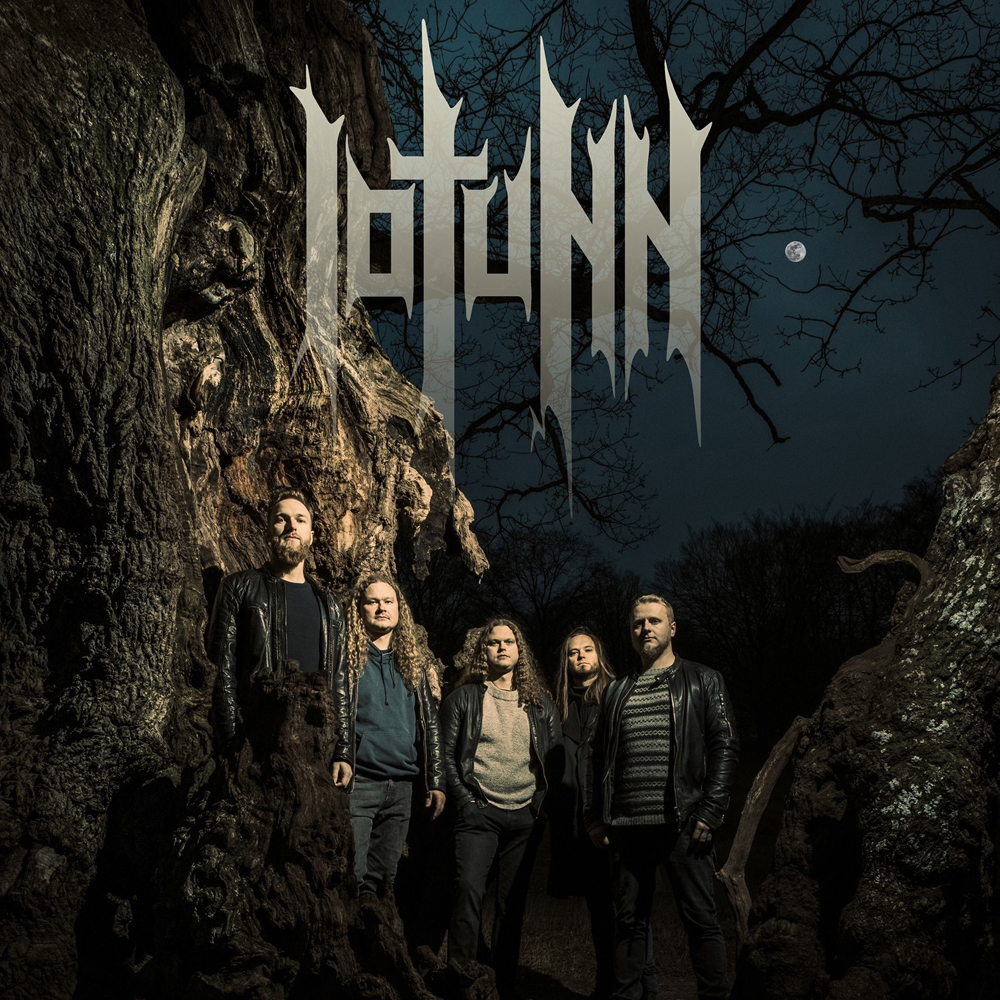
 I was only expecting good when I heard the IOTUNN debut album for the first time, but I was blown away by how much I really liked and enjoyed it. But I am also a busy woman and when the label asked me if I want to do an interview with the band as well, my initial reaction was “Nah man, ain’t nobody got time for this!”, but what I wrote was “Let me think about it, maybe I can fit it in my schedule.” And well, after some thinking about it, I felt more and more the need to do an interview. And being able to do it with Jón Aldará, the singer of the band, felt even better. We haven’t met for more than a year now (thank you, Corona) but thanks to the brave new world of video chatting it was possible to have a nice chat and see each other. So Jón and I sat down on the Saturday after the album release to talk about the IOTUNN album “Access All Worlds”, what motivated him to join yet another band, what inspired him, the perfect soundtrack to the current Mars missions, the relationship between Danes and Faroese and of course birds. But read yourself:
I was only expecting good when I heard the IOTUNN debut album for the first time, but I was blown away by how much I really liked and enjoyed it. But I am also a busy woman and when the label asked me if I want to do an interview with the band as well, my initial reaction was “Nah man, ain’t nobody got time for this!”, but what I wrote was “Let me think about it, maybe I can fit it in my schedule.” And well, after some thinking about it, I felt more and more the need to do an interview. And being able to do it with Jón Aldará, the singer of the band, felt even better. We haven’t met for more than a year now (thank you, Corona) but thanks to the brave new world of video chatting it was possible to have a nice chat and see each other. So Jón and I sat down on the Saturday after the album release to talk about the IOTUNN album “Access All Worlds”, what motivated him to join yet another band, what inspired him, the perfect soundtrack to the current Mars missions, the relationship between Danes and Faroese and of course birds. But read yourself:
Anne: Congratulations to your album and the many positive feedbacks you have gotten so far! I have to admit that my expectations were pretty high because I know you wouldn’t join a band that doesn’t have a certain grade of quality and also your musical taste and mine are quite similar and so it’s not very likely you would join a band that I would not like. So I had high expectations but I was really blown away by how good it is. And I guess you were pleased to receive all those positive reviews and opinions so far.
Jón: Yes, totally. And yours, too.
Anne: Did you even get any negative reviews yet?
Jón: Not really. Not negative. I haven’t seen any negative so far, it’s been mostly positive to very positive. There has of course been a lot of grades or ratings. A lot of the ratings have been somewhere around 8 or 9 out of 10, and then some 10 out of 10. And then we have something strange, like I think Deaf Forever uses a 15 scale which was also really good, it was like 12 or 13 out of 15 or something like that and Metal Hammer is like 5 out of 7, something like that. So everything has been above average, I would say. And most of the reviews have been really good, so we’re all pretty overwhelmed by that, I have to say. It’s pretty strange also, because the album has been in our collective minds for so long. It’s been in development for so long and then also it’s around a year ago since we finished recording it, so you kind of get this strange relationship with the album where it’s not really new and then all of a sudden it kind of becomes new again when we see it through other people’s eyes and people describe how they feel listening to the album. And to see that people really get something positive out of the album - that kind of revitalizes it for us as well.
Anne: I think it’s quite funny to read the reviews because nearly every reviewer uses another genre to describe your music. I read Black Metal, Progressive, Melodic Death, Dark Metal, Doom and some more. I, personally, would go for Progressive because that’s a really big box and you can fit a lot of things into. What would you choose or do you even want to get placed in a specific genre or would you want to be put into a box?
Jón: Well, I think you make music that fits into what you like, typically, so I think we all like certain things that inspired the music that we write but it’s not like a conscious thing where we go. “Let’s do something that’s like this or like that”, and then afterwards we hear, “Oh yeah, I guess I was definitely inspired by this or that band when we wrote this”. But I think there are definitely some bands that are big influences and maybe on purpose I think I’m not going to mention them, but they have been mentioned in reviews and that makes sense. That they are big influences. But they’re also different enough and eclectic enough bands that it’s hard to associate our music directly or to say “this is a copy of this or that”. So I think it’s eclectic enough and complex enough influencewise that it’s difficult to really pinpoint. I would say that we are sort of in the Melodic Death Metal Progressive area, but saying that, by just naming those genres you couldn’t have all kinds of different types of music in your head, based on those genre tags, so I’d rather not put a genre on it. But I would say it makes a lot of sense what people have been saying about. I mean, even the people who are contradicting themselves, I think, are right. Or contradicting others. The people that are saying totally separate things, they are both right.
Anne: And what you mentioned about the bands, that is also quite funny in the reviews, because you’re getting compared to so many different bands. I read like ten different bands or even more. They say you sound like INSOMNIUM, like SCAR SYMMETRY, like DISSECTION, SANCTUARY, like THRESHOLD, like DIMMU BORGIR, and so many more…
Jón: Really, those bands, too?
Anne: Yes, BATHORY and DISILLUSION, PRIMORDIAL…
Jón: Yes, PRIMORDIAL, BATHORY, ENSLAVED I think, someone’s been saying. And maybe some of the Norwegians like BORKNAGAR and ARCTURUS I’ve heard, which are definitely bands that we all, or most of us, really love and so – some of it makes sense, other things I can’t really hear but I think it is fun, because all of those bands, pretty much all of those bands that people mention, are bands that I really like or respect. So, well, I mean if it’s a positive connection to a really good band, then sure, that’s fine.
Anne: When and how did you become a member of the band and at what stage of songwriting for the album have the others been at that time?
 Jón: I think it was in the winter of 2018/19, when I started joining the working process of the album but by then pretty much most of the material was already written. The song structures, the riffs and the soundscapes were all in place, so there needed to be some leading vocals that connected everything. But no lyrics had been written and no vocal melodies had really been written either. So I was just given free reign to just start writing my own way and my own idea of what the concepts should be and what the lyrics should be, based on the music I heard. The reason I joined was because they showed me the music they had written and it was really spectacular and I was like, “I actually want to try my hand at it and see if I can fit in this kind of musical landscape somehow.” Because it’s quite different from the other stuff that I’ve done. It’s not vastly different, it could be more different, it’s still in that kind of moody, atmospheric Nordic semi-progressive area which I worked on before. But it’s still different enough that I wanted to try and so I just started making melodies and finding out how to arrange the vocals within the songs and that was really, really fun. And even though time was a little bit of a factor - it was difficult to find the proper time with my work and other band and stuff. It was a bit of a difficult decision to make. To say “Ok, I’m actually going to join another band”, and you know, “This has to be really good if I’m going to dedicate my non-existent time for it.” But I thought it was and fortunately it was really fun working on it. And the guys in the band were just so passionate and enthusiastic and talented as well and that’s kind of inspiring, too. So that’s what kept me in the process all the time. That they were so involving. But it took about a year to really both write things and record the vocals and also to make small adjustments. When the vocals come you start to see the song in a different way and then you think “Ok, maybe we can change this and that, to better fit the vocal arrangements and everything”. You have to be flexible with all the instruments, so they flow together perfectly. So there were a lot of adjustments throughout 2019 and then early 2020 we could finally start mixing.
Jón: I think it was in the winter of 2018/19, when I started joining the working process of the album but by then pretty much most of the material was already written. The song structures, the riffs and the soundscapes were all in place, so there needed to be some leading vocals that connected everything. But no lyrics had been written and no vocal melodies had really been written either. So I was just given free reign to just start writing my own way and my own idea of what the concepts should be and what the lyrics should be, based on the music I heard. The reason I joined was because they showed me the music they had written and it was really spectacular and I was like, “I actually want to try my hand at it and see if I can fit in this kind of musical landscape somehow.” Because it’s quite different from the other stuff that I’ve done. It’s not vastly different, it could be more different, it’s still in that kind of moody, atmospheric Nordic semi-progressive area which I worked on before. But it’s still different enough that I wanted to try and so I just started making melodies and finding out how to arrange the vocals within the songs and that was really, really fun. And even though time was a little bit of a factor - it was difficult to find the proper time with my work and other band and stuff. It was a bit of a difficult decision to make. To say “Ok, I’m actually going to join another band”, and you know, “This has to be really good if I’m going to dedicate my non-existent time for it.” But I thought it was and fortunately it was really fun working on it. And the guys in the band were just so passionate and enthusiastic and talented as well and that’s kind of inspiring, too. So that’s what kept me in the process all the time. That they were so involving. But it took about a year to really both write things and record the vocals and also to make small adjustments. When the vocals come you start to see the song in a different way and then you think “Ok, maybe we can change this and that, to better fit the vocal arrangements and everything”. You have to be flexible with all the instruments, so they flow together perfectly. So there were a lot of adjustments throughout 2019 and then early 2020 we could finally start mixing.
Anne: Do you think this writing process will change a bit, now that you are a complete band, for the next album?
Jón: Yes. Yes, I think so. Of course, our bassist, Eskil, he joined the band even later than I did, so pretty much all of the vocals and the songs were written when he was asked to lay down some bassparts. Otherwise it was Jens Nicolai Gräs, the guitarist, who recorded the bass, but we all kind of thought “You know what? It would have been raised to an entirely new level to have an actual proper bassist making proper bass arrangements that don’t sound like a guitar.” And Eskil is crazy talented, both technically and creatively, when it comes to groove and everything so it really, really elevated the whole album that he was able to join and then also create his own bass arrangements within the songs. I was really surprised to see that that could be done in such a way. Typically, the position of bass in metal is very often resigned to providing the oomph, the power and just kind of following the guitar lines as much as possible, but Eskil went in a totally different direction, which is fantastic. So…yeah, what was your original question by the way?
Anne: I was asking if your writing process will change in the future, now that you are a complete band.
Jón: Yes, exactly. So you know, that is kind of an odd thing. The bassist coming in so late. Me coming in so late. So I think there will definitely be some changes, we will be able to follow the process from an earlier point. There will still be Jesper and Jens Nicolai, the guitar brothers, they write a lot of stuff, they’re very, very prolific when it comes to writing material and a lot of it is really, really crazy good. So we can’t really follow that so much. So they are creating the songs for us to continue arranging afterwards. So that is going to be the process I think. But now we can actually join in that early stage of writing the songs and say: “You know, I have a vocal line that would fit in better if we did it this way.” Basswise I think we could arrange the guitars and the bass around each other a bit closer and stuff so it’s definitely going to be maybe more a holistic and complete way of writing and arranging. So it’s going to be interesting to see how that will affect the next record. But then again the next record is pretty much already written. And the third one is almost on the way. I mean, they’re writing so much. So there is no shortage of material but that doesn’t really mean that we can use and slap it all together and put it out. It takes a lot of work to get the album to make sense and everything but we’re definitely already well on the way with the second album.
Anne: Corona has been and still is a challenge for the whole music scene, but did it complicate working for you together or does it maybe make it even easier, as there are barely any things that could disturb or distract from the working process like nobody has concerts, tours or private holidays?
Jón: Hm. I think as we were able to actually record and mix the album just before Corona hit, there were no real restrictions. I mean, if we had started a year later on the album, we would have not been able to do the process the way we did. Because what we did was: I flew every month from the Faroes to Denmark to work on vocals in Copenhagen and record them, which was a lot of trips. A lot of traveling. All through 2019. Basically from January to December or even January or February of 2020. And then Corona hit, when was it? Was it like late February when it started being serious? Around these parts at least, and we just finished mixing the album then. So it’s sort of ok. The album is done, now we can start shopping for record labels and stuff like that. So Corona hadn’t really affected us in any way. The only way I would say it affected us, is now. Around the arrangements around the album release. Because we had planned an album release concert and some follow-up gigging and touring. But now it’s finally starting to interrupt the flow of the album release and stuff like that. We had a few concerts lined up last year, which were of course cancelled, almost prompt but not a huge amount. This is kind of… this is a little bit worse. You know, every other band is dealing with this, so we can’t really say we were special in this regard. But I don’t think it has done anything necessarily positive for us either, really. It’s just, we had the whole album and all the package ready before shopping for records labels so we were prepared for a period of just finding the correct setup to release the album and so everything has been following the plan more or less. Until now.
“I think the album will be a pretty nice soundtrack for people following these Mars exploration missions”
Anne: But I mean, you said you already started writing songs for the second and third album, so does it have any influence on that work?
Jón: Hm, yes, that’s quite a possibility. We just released this one, so I think the work on the second album is continuous – we’re not entirely sure how much time it’s going to take us to get somewhere. I think there is a plan to do some recording already this year, but I have the HAMFERÐ album to focus on now. So I will not be joining the writing process for the second album of IOTUNN right away. It’s going to be a little bit slow for me because it’s both albums at the same time. So we’ll have to see and also we are kind of hoping, maybe expecting, that there will be less Corona interference after summer when all of the vaccines have been administered in most of the western world, I guess. So maybe the grip of Covid-19 will start to loosen later this year and then maybe we will be free to do as usual. But, you know, you can only hope.
Anne: Yes. Are you the only one responsible for the lyrics or do the others add ideas as well?
Jón: Mostly. I would say 99%. And then I discuss them with the others and if the others may have some interesting input I’m always open and sometimes it gets used and sometimes I’m just being a dictator and saying “No, you know what, I’m the one who decides!” [laughs]. No, I’m just kidding. It’s pretty relaxed and I’m pretty much given the full control of that aspect, but always open for ideas. So, yeah, a little bit of input both lyrically and vocal arrangement-wise, but musically there has been a lot of input from the other guys, about arranging the vocals, creating melodies and stuff like that. So that’s been more of a collaboration process. Lyrics were mostly mine, yes.
 Anne: Can you tell a bit about the story of this album and what it is about?
Anne: Can you tell a bit about the story of this album and what it is about?
Jón: In very simple terms it’s about a crew of space travelers on bord an exploration ship called the Garganey I. They are leaving Earth, which is sort of a derelict, dystopian future world, where humanity is hanging on to deal life and it’s not very livable anymore. So they set out to search for other planets where humanity can continue to exist. So that’s the basic background for the story. And then they - it’s very thematic in a way. It’s philosophizing a little bit about the place of humanity in the universe and what do we add to existence, are we kind of the center of existence? Do we need to continue as a race? Can we continue as a race in other parts of the universe? Can we continue to exist without some of the things that we think are necessary from the Earth? And stuff like that. So they are visiting different planets and testing out, finding kind of alien beings that are living in totally different ways than humans are and trying to figure out “Can we live this way? Is this any life for us?” So there is a lot of this, the soul of humanity, what do we need? Not just to survive, but to exist meaningfully. So they visit these different types of planets, that are not really habitable and then, in the end, they do find this kind of paradise system of planets where everything seems like a Utopia, like a perfect paradise for man to maybe exist, but they have a problem: They can choose either to stay there themselves and continue humanity or they can use the technology of the spaceship to return to Earth and let people know of this. And try to save the rest of humanity. But that technology has never been tested before. So they don’t really know whether that will doom them or help them save the rest of humanity. So it’s kind of a dilemma at the end there. That’s how it ends.
Anne: How did you get the idea for the lyrics or for the whole theme and what was your inspiration?
Jón: That’s a good question. It just kind of came into being. I listened to the music and I wanted to make something spacey and the music gave me a feeling of soaring through space in an almost mythical way. A kind of strange feeling. Some of the music is a little bit psychedelic in a way and atmospheric in that way so we all agreed that it would be really cool to have this kind of strange, philosophical journey through space. So I just started to work from there. Really mostly just from a visual aspect and then I thought “Ok, this will be a pretty cool framework for the lyrics”, that both explore these big themes of our place in the universe, but also of the people on board who are uncertain and afraid and excited, all at the same time. Going through different emotions while encountering planets and new things and also hopelessness and doubt about… Is there any point in this at all? That kind of thing. So there is a lot of big emotions going through and I really like that, you know. And I think that fits really well to the music. I think it just sprang from listening to the music that the Gräs brothers had written earlier.
Anne: How much Jón, the natural scientist and how much Jón, the poet is in the lyrics?
Jón [laughs]: That’s a good question. I think mostly the poet, which is often that aspect that I invoke when it comes to music, but, you know, somewhat informed by the natural scientist in a way. Of course, I’m a biologist, and so I had imagined these different kinds of existing outside of Earth, where beings would somehow exist. Sometimes in total chaos, constant chaos, sometimes without a proper biosphere, maybe only in dirt and with very, very, very restricted resources with machinery kind of doing most of the work. So definitely that part of my life inspired some of those aspects. And of course the general idea of meaning in the universe which – I think science informs in a lot of ways. So, that part of me is not completely absent from the concept, no.
 Anne: The opening song is the “The Voyage Of The Garganey I”. Will we hear of the Garganey II in the future?
Anne: The opening song is the “The Voyage Of The Garganey I”. Will we hear of the Garganey II in the future?
Jón: [laughs]: The Garganey II! Well, that’s a good question actually. Because… will there be a Garganey II? The Garganey I is the spaceship and there is only one ever made at that point and I think we might go a bit of a different route next time. We go a route where we won’t need a spaceship, I think. Probably. But you never know actually. You never know. It’s not completely set in stone. But we’re thinking about doing something more earthbound next time, more kind of old, something that springs from within the Earth somehow. But I definitely have an interest in connecting it to this first album, so let’s see if there will be any references to the Garganey II. Let’s see.
Anne: With the official release yesterday you missed the Mars landing by just around one week. And there are three Mars missions this month. So was this a nice coincidence or was it planned to release the album in this month?
Jón [laughs]: Yes, it was planned to release it this month, but it’s kind of a fun coincidence, I would say. I think we should have maybe made a bigger spectacle out of it, trying to connect it a little bit better, but you know what? I think the album will be a pretty nice soundtrack for people following these Mars exploration missions. Reading articles about it, and watching pictures from Mars and then listening to the music, I think it would fit perfectly, to be honest.
Anne: When you read or hear the word “Garganey” it first sounds a bit like something from a Russian space program, but actually it’s the name of a duck that migrates over very long distances. So is this some sort of an earthly aspect of the theme?
Jón: Yes. Yes, it is. It’s this interesting species of duck, because it’s both really beautiful and unspectacular at the same time. And it’s an overlooked kind of species. It’s easily overlooked, because it’s a small, brownish duck when seen on the surface level which I thought was kind of cool, because it’s definitely its very own thing, its own species that has its own life history and everything so it represents a unique thing that goes under the radar in a way. Somehow I thought that would be very fitting for the spaceship name, somehow inspiring the spaceship. Nothing that spectacular, but still something really unique. And of course the migrating part definitely fits well with going far into the universe. And of course the reference to nature and biology and that sort of stuff that grounds the spaceship in something earthly and real.
Anne: I think there is also a bird on the cover and also in the video to “Weaver Systems” you can see birds. So what role do birds play in this space voyage?
Jón [laughs]: Well, I think they have always been a symbol of freedom for people. It’s this sort of freedom to move through three-dimensional space while all of us earthbound creatures are cursed to wander two-dimensionally mostly [laughs]. So there is something really inspiring about birds in general and how they are able to live completely different than we do. And use both air and land and often also sea and water to their advantage, so, yeah, it’s a symbol of freedom, and I think that’s also the idea of the album in a way. To in some ways find us a save space where humanity can be free to continue on and stuff like that. It’s these general ideas about freedom I think.
Anne: I think in general that the lyrical concept can be seen as well as traveling between worlds and as traveling the human life. What are your thoughts about that?
Jón: Oh yes. Definitely, yes. That’s where I am with, that it basically connects the inner world with the outer world in a way that we think is pretty interesting. That we live both inside ourselves and outside ourselves and we see the big perspective but we are also kind of at the same time lost in our own particular perspective. So that’s - I would say duality - but it’s also a bit of a paradox that we seek to find the big solutions, like huge connections between groups of people and then we always have our own personal agendas at the same time. And that is kind of a struggle between those aspects I think. Which is very interesting.
.
“You don't want to frustrate people or bore them unnecessarily.”
Anne: In the song discussion video for “The Tower Of Cosmic Nihility” Jens and Jesper say that the song originally was 18- 20 minutes long and then you stripped it down to 7:30 min. How do you proceed in such a case?
Jón: Oh, actually I don’t know. The version I have heard was pretty much that, finished one. But we definitely did shorten songs during the time that I worked on the album as well. It’s really important that you have a clear idea of what you’re doing with the song. And sometimes you can get carried away with following the ideas and where the song leads you almost to absurdity. And then you suddenly have a 20-minute-song in your hands. Maybe you get really attached to all the ideas separately, but if you listen to the whole song and you look at it you think, “you know what, I think this song would be stronger if we cut here and there and there” and then you try to find the core of the song. And then, if we need to build something extra to it, then we can do that afterwards but then it’s kind of zero in on what the song is saying and why… How long does it need to be? Does it need to be 20 minutes long? Or is it two or three different songs in there? It could be separate. So it’s pretty important, especially for the listener, I think. Other people that are supposed to get something out of your music. You don’t want to frustrate people and bore them unnecessarily. So that’s important work.
Anne: I heard you sing many times and on many releases but I have to admit that I was surprised to hear that you have become even better – in my opinion. I would even say this is your best singing performance I have heard so far and you also use some singing styles that I think I haven’t heard from you before, at least not in that extent, like in “Laihem’s Golden Pits” or in “Waves Below”. I think I never heard you sing that brutal.
Jón: Oh, thank you! Thank you very much! I’m really glad to hear you say that. And well, I used that style a little bit here and there. In a few spots in some HAMFERÐ songs I do use that. If you go back to the first EP of HAMFERÐ, to the song “Vráin”, there is a little bit of that in there and then also the song “Sinnisloysi” from the album “Evst” has as little bit of that. So I’ve always had a need to insert a little bit of this kind of semi-shouting voice which gives off a totally different vibe than growling and clean singing. I have a naturally sort of soft clean voice when I sing. It’s not super natural for me to put that kind of aggression into that as much but then I found that other way of singing and it seems to work especially on those two songs, “Laihem’s Golden Pits” and “Waves Below”. So I thought “Ok, let’s try this there”, because that is what I’m hearing, some sort of frustrated madman standing on top of a mountain shouting over this. But… yeah, I’m glad you noticed. [laughs].
 Anne: And now a technical question: What microphone are you using?
Anne: And now a technical question: What microphone are you using?
Jón [in a low voice]: Oh fuck [I heard that! - Anne]. We used a Shure SM7 I believe… yes, it was a Shure SM7.
Anne: So you used that for recording?
Jón: Yes. It’s Bjørn’s, the drummer’s, microphone. He is the one who engineered the album and recorded the whole album, and yes, that’s his microphone, a Shure SM7. Which was really nice, actually. I haven’t recorded with that one before. I always had kind of different mikes, never really have been settling on one specific thing, just whatever felt right in the studio and what was available. So I think that was pretty good.
Anne: Do you prefer a specific one for playing live?
Jón: I do have my own live mike, which is a KSM9, which is a live condenser mike, so it has some really, really cool qualities which also allows me to work with it a little bit more physically and also just sounds really great. It has a super clear and nice sound. So I’m really happy with that, I always use it when I’m gigging.
Anne: I really like the way you arranged the songs, like for example in “The Tower Of Cosmic Nihility”. I really like how the drums slowly come to the foreground and just before they become too much, they return more to the background again and leave room for the other instruments.
Jón: Yes, that’s Bjørns kind of vision of the songs, because he works all his drumming into the songs, he creates his own drum world, his own rhythmic world within the songs. So that’s all him. And it’s really amazing what he can, how good he is at creating these dynamics within the songs. He has a very unique drumming style, I think, which is not really necessarily super flashy as such, but it’s still quite fill-heavy and very doublebassy and stuff. It’s weirdly subtle as well. In that sense, I think. I haven’t actually consciously thought of that, but now that you mention it, that’s a really cool thing, yes.
Anne: I also really like how you found the perfect balance between atmospheric sounds and the really harsh parts.
Jón: Yes. That’s typically the guitars sounds. The Gräs brothers, they love to play really loud. Loud and rough. Raw. So that’s pretty much their guitar sound that really dominates the album a lot. And then, as you say, there’s these several effects and synths and guitar effects and stuff, that kind of spices everything up a little bit. It’s pretty subtle, but yes, I’m really happy with the balance between those things.
Anne: “Save Across The Endless Night” really sounds like it’s the essence of the album and contains more or less everything in it and even if you don’t get that from the lyrics, you get it from the music, which I think is pretty impressive.
Jón: Yes, that is not the first time I’ve heard that, actually and I think that makes a lot of sense. I think “Save Across The Endless Night” is probably the most varied song. So it seems a little bit like an overture in a way, I think.
Anne: I also really like sound and production, it’s very detailed and differentiated and you can figure out every single instrument and the sound is really good, pretty punchy. So many other albums, when you listen to them after your album, they sound a bit - empty. And I also think it has a really slightly early 2000s IN FLAMES touch which I think comes from Fredrik Nordström.
Jón: Yes, I totally love that. You know, a lot of the best productions – in my mind, they are what I associate with the best metal music - is late 90s production, typically Swedish. You know, there was a sound there that is so hard to imitate. And you have all these really, really great producers, Daniel Bergstrand and Fredrik Nordström and Peter Tägtgren, all the Swedish greats and even the older ones of course, Tomas Skogsberg, the guys who did the earlier Death Metal as well. Somehow it’s this kind of really cool history in Sweden of just knowing what to do with Metal soundwise. So I’m really happy with the decision to go to Fredrik Nordström to do this album because he really has this deep and larger than life powerful sound. And almost too much at some point, but it’s kind of …it fits the album I think.
Anne: I think you already answered my next question because that would have been “Do you already have ideas for the next album?” I think you have.
Jón: Well, yes, we pretty much have almost all the ideas for the next album.
Anne: And you are now officially singer in three bands, how many more do you want to join…
Jón: No more! No more! [laughs]
Anne: … and aren’t you afraid you’re getting into conflicts or running out of touring time?
 Jón: No, no, it’s impossible. But then again I would say, currently I’m in two active bands and BARREN EARTH is sleeping I would say. We’re all very busy with all our other stuff, the BARREN EARTH guys, so we’re all ok with BARREN EARTH sleeping now and who knows if that will awaken again, but yes, so it’s mostly IOTUNN and HAMFERÐ that’s filling up the schedule at the moment. And so far Corona has safely helped us avoid any scheduling conflicts [laughs], but let’s see what the future brings. I’m not a career musician and I’m a fulltime biologist and so it’s… I face those problems when they come, I think.
Jón: No, no, it’s impossible. But then again I would say, currently I’m in two active bands and BARREN EARTH is sleeping I would say. We’re all very busy with all our other stuff, the BARREN EARTH guys, so we’re all ok with BARREN EARTH sleeping now and who knows if that will awaken again, but yes, so it’s mostly IOTUNN and HAMFERÐ that’s filling up the schedule at the moment. And so far Corona has safely helped us avoid any scheduling conflicts [laughs], but let’s see what the future brings. I’m not a career musician and I’m a fulltime biologist and so it’s… I face those problems when they come, I think.
Anne: You’re now on the same label, with both bands, with HAMFERÐ and IOTUNN. Would it be possible to tour together or would two gigs per evening just be too much for you as a singer?
Jón: Yes! Yes, I think it would be too much. I have tried I think once to play at the same festival on the same day with BARREN EARTH and HAMFERÐ and it was doable, but it was not very easy. And I am kind of fearful of what a tour would do to me if I had to do two different gigs. And both bands are very physically demanding. Or at least my performance style is very physically demanding so I think it will be too much. So that is something that I want to avoid pretty much. Indefinitely.
Anne: Yes, it’s understandable. Are there even any touring plans as nobody can really plan anything right now?
Jón: Yes, we are working on plans. There is something that is in the works for next year, 2022. But nothing has been announced yet so I’m not going to say too much – you never know these days. But it’s definitely something that’s really already well developed. So all it really needs is the safety from lockdown and stuff like that. So I think this year there will maybe be some local gigs, small tours, like weekend tours, if we can get away with it. So that is what we have in preparation right now. But otherwise it’s just too unsafe to say anything more.
Anne: We’ve already reached my last question, it’s not completely serious, but how hard is it to be the only Faroese person in a full-danish band and do they treat you well?
Jón [laughs]: Strangely enough it’s really nice. But yes, it’s not unkown that the Faroese and the Danish have their sort of friendly quarrels, if you can call it that. Sort of a little bit of an antagonism due to our history and stuff like that and they’re kind of… we’re part of their kingdom and all of that but these guys in IOTUNN, they are so nice and so respectful and so intelligent kind of types, so it’s… they’re so undanish. No, no, I’m just kidding! Don’t say I said that [Of course I do – Anne]! No, they’re just really, really, really great people to be around and really inspiring people to be around, so it’s a pleasure, it really is.
Anne: And those were all my questions, I thank you very much for the interview, for taking your time.
Jòn: Yeah, sure.

